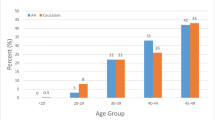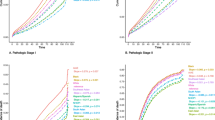Abstract
Introduction
There are significant differences in the phenotype of CRC by race in the U.S. A similar CRC phenotype-race relationship also appears to exist in South Africa (SA). However, there is a paucity of comparative data on the presentation and survival of CRC in sub-Saharan African by country of origin or race. This study compares clinicopathologic variables between CRC patients in Nigeria and SA.
Methods
From a prospective CRC database, consecutive patients diagnosed between September, 2013 and October, 2018 from the African Research Group for Oncology in South West Nigeria were compared to consecutive patients diagnosed from January, 2016 to October, 2018 from the Colorectal Cancer in South Africa database. Patients with histologically confirmed adenocarcinoma were included. Patients were excluded if they had in-situ disease or no histological diagnosis. Clinical outcomes were calculated from the date of presentation. National census categories were used to define self-reported race in SA.
Results
The mean age at presentation in Nigeria (n = 347) was 54.1 years (SD 15.5) compared to 56.8 (SD 13.7) in SA (n = 534). The median age among Black SA (BSA) patients was significantly lower than the median age among White SA (WSA) patients (55 vs. 63, p < 0.001). Right-sided colon cancer was more common in Nigerian (27.4%) and BSA (21.2%) patients compared to WSA patients (15.2%, p < 0.001). Nigerian (39.1%) and BSA (16.7%) patients were also more likely to present with mucinous histology than WSA patients (4.9%, p < 0.001). There was a significant difference in the stage-at-presentation between the cohorts, with a large burden of stage IV disease in the Nigerian cohort (52.6%). Adjusting for stage-at-presentation, there was a significant difference in the median overall survival between country and racial cohorts.
Conclusion
There are significant differences in the phenotype of CRC between Nigeria and SA. Nigerian and BSA patients, appear to share characteristics that are different than those of WSA patients. Larger series with tissue banking and next-generation sequencing are needed to better delineate these observed differences.

Similar content being viewed by others
References
Karsa LV et al (2010) The dimensions of the CRC problem. Best Pract Res Clin Gastroenterol 24(4):381–396
Arnold M et al (2017) Global patterns and trends in colorectal cancer incidence and mortality. Gut 66(4):683–691
Cunningham D et al (2010) Colorectal cancer. Lancet 375(9719):1030–1047
Xicola RM et al (2014) Excess of proximal microsatellite-stable colorectal cancer in African Americans from a multiethnic study. Clin Cancer Res 20(18):4962–4970
Irabor DO et al (2017) Microsatellite instability is common in colorectal cancer in native Nigerians. Anticancer Res 37(5):2649–2654
Irabor D, Adedeji OA (2009) Colorectal cancer in Nigeria: 40 years on A review. Eur J Cancer Care (Engl) 18(2):110–115
Ibrahim KO et al (2011) Morphology of colorectal carcinoma among Nigerians: a 30-year review. Niger J Clin Pract 14(4):432–435
Irabor DO (2017) Emergence of colorectal cancer in West Africa: accepting the inevitable. Niger Med J 58(3):87–91
Saluja S et al (2014) A comparison of colorectal cancer in Nigerian and North American patients: is the cancer biology different? Surgery 156(2):305–310
McCabe M et al (2020) Descriptive epidemiological study of South African colorectal cancer patients at a Johannesburg Hospital Academic institution. JGH Open 4(3):360–367
Cronjé L, Paterson AC, Becker PJ (2009) Colorectal cancer in South Africa: a heritable cause suspected in many young black patients. S Afr Med J 99(2):103–106
McCabe M et al (2019) Microsatellite Instability assessment in Black South African Colorectal Cancer patients reveal an increased incidence of suspected Lynch syndrome. Sci Rep 9(1):15019
Duduyemi BM et al (2020) Significance of DNA mismatch repair genes and microsatellite instability in colorectal carcinoma in Ibadan, Nigeria. Am J Med Biol Res 1(4):145–148
Lai Y et al (2016) Effects of cancer stage and treatment differences on racial disparities in survival from colon cancer: a United States population-based study. Gastroenterology 150(5):1135–1146
Knapp GC et al (2019) Is colorectal cancer screening appropriate in Nigeria? J Glob Oncol 5:1–10
Bebington B et al (2018) Design and methodology of a study on colorectal cancer in Johannesburg South Africa. JGH Open 2(4):139–143
Popat S, Hubner R, Houlston RS (2005) Systematic review of microsatellite instability and colorectal cancer prognosis. J Clin Oncol 23(3):609–618. https://doi.org/10.1200/JCO.2005.01.086
Warner ET et al (2015) Racial and ethnic differences in breast cancer survival: mediating effect of tumor characteristics and sociodemographic and treatment factors. J Clin Oncol 33(20):2254–2261
Jinjuvadia R, Jinjuvadia K, Liangpunsakul S (2013) Racial disparities in gastrointestinal cancers-related mortality in the U.S. population. Dig Dis Sci 58(1):236–43
Zhang C et al (2020) Differences in stage of cancer at diagnosis, treatment, and survival by race and ethnicity among leading cancer types. JAMA Netw Open 3(4):e202950
White A et al (2010) Racial disparities in colorectal cancer survival: to what extent are racial disparities explained by differences in treatment, tumor characteristics, or hospital characteristics? Cancer 116(19):4622–4631
Borrell LN et al (2021) Race and genetic ancestry in medicine—a time for reckoning with racism. N Engl J Med 384(5):474–480
Acknowledgements
The authors would like to acknowledge the dedicated surgical research team at OAUTHC for their help with data entry. The study was funded by the Global Cancer Disparities Initiative at the Memorial Sloan Kettering Cancer Center, with support from the Thompson Family Foundation. This research was funded in part through the NIH/NCI Cancer Center Support Grant P30 CA008748.
Author information
Authors and Affiliations
Corresponding author
Ethics declarations
Conflict of interest
The authors declare that they have no conflict of interest.
Additional information
Publisher's Note
Springer Nature remains neutral with regard to jurisdictional claims in published maps and institutional affiliations.
A preliminary analysis of the data was presented in poster format at the African Organization for Research & Training in Cancer (AORTIC) conference in Maputo, Mozambique, November, 2019.
Rights and permissions
About this article
Cite this article
Alatise, O.I., Knapp, G.C., Bebington, B. et al. Racial Differences in the Phenotype of Colorectal Cancer: A Prospective Comparison Between Nigeria and South Africa. World J Surg 46, 47–53 (2022). https://doi.org/10.1007/s00268-021-06304-z
Accepted:
Published:
Issue Date:
DOI: https://doi.org/10.1007/s00268-021-06304-z




